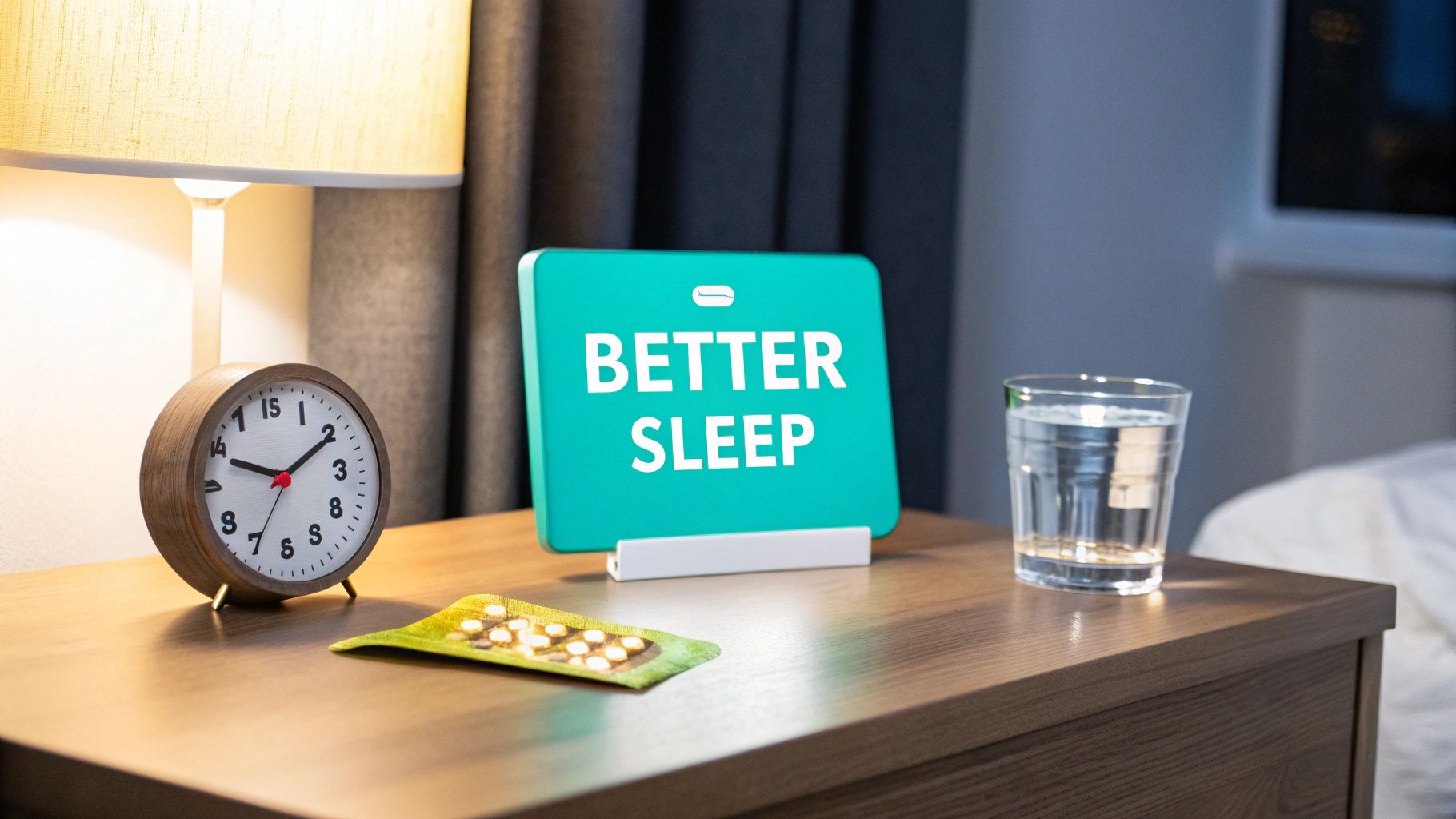

· By Annemarie
How to Sleep Better After Drinking: Tips for Restful Nights
We’ve all been there. You have a few drinks, feel that pleasant, heavy-eyelid drowsiness creep in, and think, "This will help me sleep." It’s a classic myth, and one that couldn't be further from the truth. While that nightcap might help you fall asleep faster, it's actually setting the stage for a rough, fragmented night.
If you really want to learn how to sleep better after drinking, you first have to understand what’s going on inside your body.
Why You Can’t Blame the Noisy Neighbors
That initial sleepy feeling? It's a bit of a trick. Alcohol is a central nervous system depressant, which is why it can knock you out quickly. But as your body starts to process it, everything gets thrown out of whack.
A few hours into the night, as the alcohol wears off, your brain goes into what’s called a "rebound effect." It basically overcorrects, shifting from a suppressed state to an overstimulated one. This is the exact moment you jolt awake at 3 a.m., staring at the ceiling, wondering why you can't get back to sleep.
The Problem With REM Sleep
One of the biggest casualties of a night of drinking is your REM (Rapid Eye Movement) sleep. This is the good stuff—the deep, restorative phase where your brain processes memories, regulates emotions, and truly recharges. Alcohol is notorious for suppressing REM sleep, especially in the first half of the night.
When your body misses out on that crucial REM stage, you wake up feeling mentally foggy and emotionally drained, even if you technically got a full eight hours of sleep. It’s the reason you can feel completely exhausted, no matter how long you were actually in bed.
To get a clearer picture, just look at how a night of drinking messes with your sleep cycle.
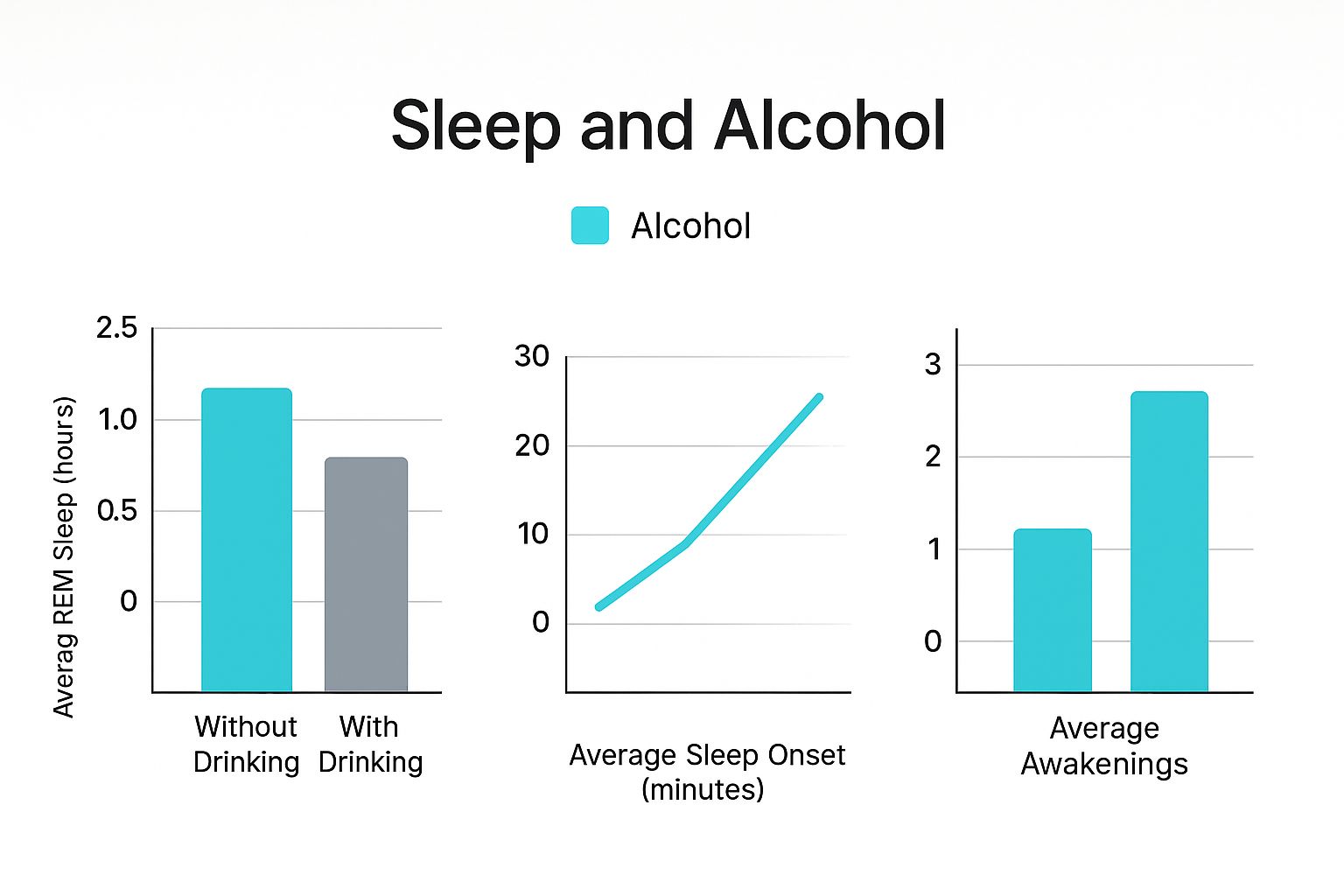
The data doesn't lie. You might nod off a little quicker, but the price you pay is more wake-ups and way less of that precious REM sleep. This kind of sleep disruption doesn't just make you tired; it can also tank your willpower the next day. We get into how this influences your food choices in our guide on what to eat after a night of drinking.
To give you a better idea of how this plays out, here’s a simplified look at what’s happening while you think you’re sleeping.
| How Alcohol Impacts Your Sleep Cycle Hour by Hour |
| :--- | :--- | :--- |
| Time After Drinking | What Happens to Your Sleep | How It Feels |
| Hours 1-3 | You fall asleep quickly. Alcohol suppresses REM sleep and promotes deep sleep. | You feel like you've passed out hard and are sleeping soundly. |
| Hours 3-5 | Alcohol metabolism kicks in. Your body starts to rebound, leading to lighter, more fragmented sleep. | You start tossing and turning. You might wake up feeling hot or thirsty. |
| Hours 5-8 | The rebound effect is in full swing. Your brain is overactive, making deep sleep nearly impossible. | You're waking up frequently, often for good. You feel restless and unrefreshed. |
It’s easy to see why you wake up feeling like you barely slept at all. The more you drink, the more pronounced these effects become. Population studies have found that men who are heavy drinkers are 30% more likely to wake up multiple times throughout the night. It's a vicious cycle, but one you can definitely break.
Smart Hydration and Nutrition Before You Sleep
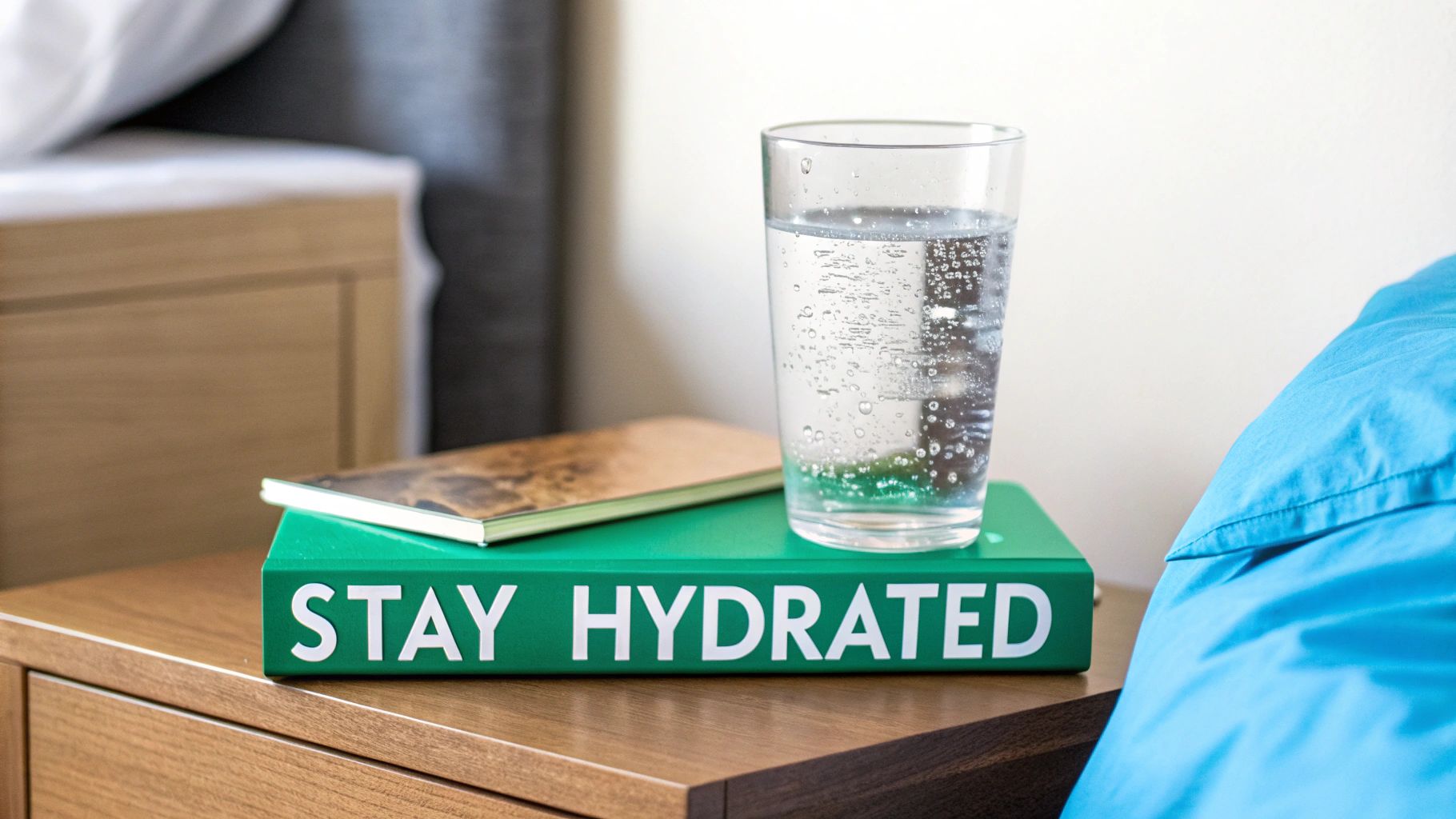
What you do right before your head hits the pillow after a night out can make or break your sleep. We’ve all been told to "drink more water," but if you want to actually sleep better, you need to be a bit more strategic with your hydration and nutrition.
Think about it: alcohol is a diuretic. That means it flushes out not just water, but crucial electrolytes like potassium and sodium. Guzzling plain water can actually make things worse by further diluting the electrolytes you have left.
Key Takeaway: The goal isn't just to rehydrate; it's to replenish. You need to pair water with electrolyte sources to get your body back in balance, helping it function properly while you rest.
Strategic Pre-Sleep Choices
Before you call it a night, your best bet is a combo of the right fluids and a small, smart snack. This one-two punch fights dehydration and, just as importantly, stabilizes your blood sugar. Ever wake up in a jolt around 3 a.m.? That's often your blood sugar crashing as your body works overtime to metabolize the alcohol.
Here are a few go-to options that really work:
- Electrolyte-Rich Drinks: Skip the plain tap water. A glass of coconut water, a low-sugar sports drink, or even water with a pinch of salt and a squeeze of lemon will do a much better job. You can dig deeper into the best way to rehydrate after drinking in our other guide.
- Nutrient-Dense Snacks: A banana is your best friend here. It's packed with potassium, an electrolyte that takes a major hit from drinking.
- Complex Carbohydrates: Just one slice of whole-wheat toast or a couple of whole-grain crackers can help keep those blood sugar levels from dipping, and it’s not too heavy on your stomach.
So, what should you avoid? Definitely step away from the greasy or spicy stuff like that leftover pizza or bag of chips. They’re a recipe for indigestion and heartburn, which is the last thing you need. Also, pass on sugary drinks like soda or juice—they’ll just set you up for another blood sugar spike and crash, ruining your sleep.
Crafting the Ideal Post-Drinking Sleep Environment
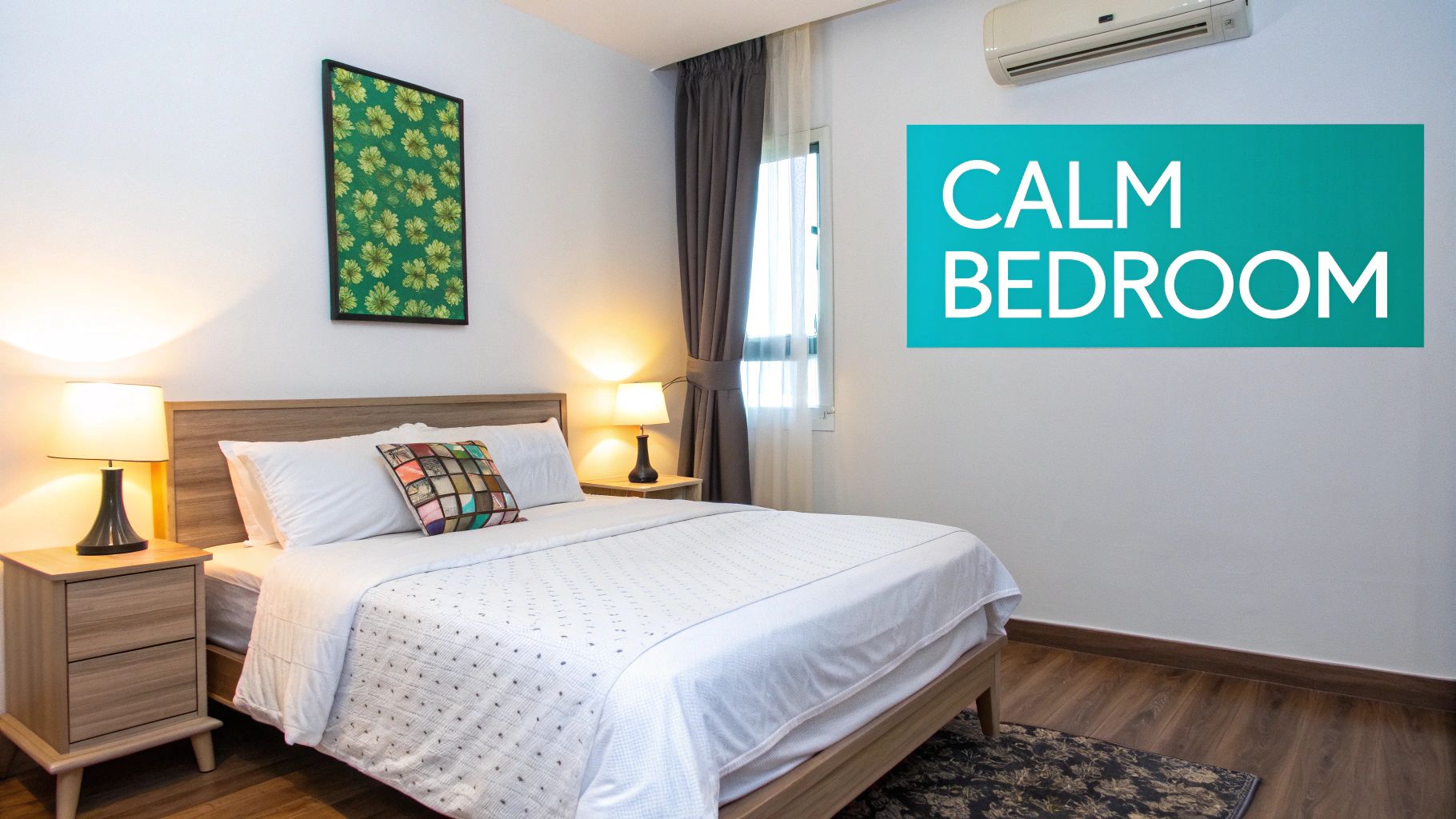
When your body is working overtime to process alcohol, it becomes hyper-sensitive to every little thing. That sliver of light from the street, the hum of the fridge, a room that's just a degree too warm—these are the things that can jolt you awake and ruin what little rest you might get.
This is why turning your bedroom into a full-on recovery sanctuary isn't just a nice idea; it's a critical part of sleeping better after a night of drinking. Your goal is to build a fortress of calm, cutting down on any and all disturbances that will only make alcohol's impact on your sleep worse. A few simple tweaks can be the difference between a night of tossing and turning and getting some real, restorative rest.
Control Light and Temperature
First things first: make your room pitch black. Alcohol already messes with your melatonin (the sleep hormone), and even a tiny bit of light can make it harder for your body to do its job.
- Blackout Curtains: Seriously, these are a game-changer for blocking out streetlights and the way-too-early morning sun.
- A Good Eye Mask: If you can't install blackout curtains, a comfy eye mask is the next best thing. It creates your own personal void of darkness.
Next up, get the room cool. Alcohol can actually raise your body temperature, leaving you feeling hot, sweaty, and restless. Aim for a room temperature between 60-67°F (15-19°C). This helps support your body's natural need to drop its core temperature to fall and stay asleep.
Your bedroom environment is one of the few things you can actually control after a night out. Making it dark and cool gives your body the best possible shot at minimizing the damage alcohol does to your sleep.
Finally, you have to manage noise. When you've been drinking, your brain is in a much more fragile state, making it easy to startle awake. Sounds you'd normally sleep right through—a car door slamming, a neighbor's TV—suddenly become major interruptions. A white noise machine or even a simple fan can create a consistent, soothing hum that masks those sudden noises. This gives you a stable auditory blanket, protecting your already fragmented sleep.
Your Next-Day Plan to Reclaim Your Sleep Cycle
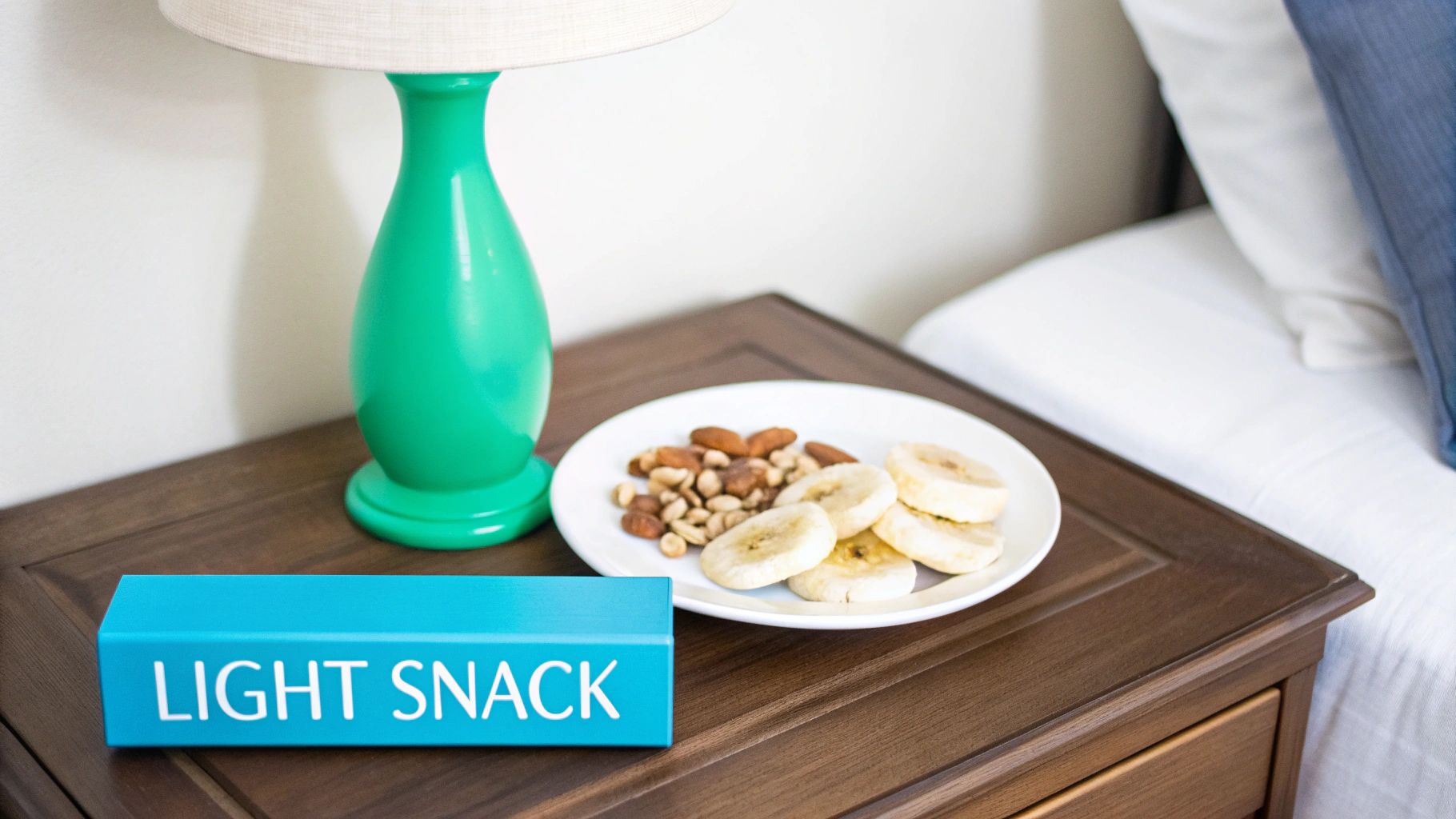
How you handle the morning after a night out is everything. It can be the difference between one rough night and a whole week of feeling off-kilter. When that alarm goes off and you feel completely wrecked, your first instinct is probably to bury your head under the pillow. Trust me, I get it. But fighting that urge is key.
Giving in to a long nap might feel like a win, but it’s actually a major setback for your internal clock, or circadian rhythm. That extended snooze makes it so much harder to fall asleep later, kicking off a frustrating cycle. Instead, the goal is to gently reset your system, not just hit the snooze button on your fatigue.
Resist the Nap Trap: If you're really struggling, a quick 20-minute power nap before 2 p.m. can be a lifesaver. Anything longer or later in the day will almost certainly mess with your sleep that night.
Gentle Steps to Reset Your Rhythm
First things first, get some sun. As soon as you're up, step outside for just 10-15 minutes. That natural light is a powerful signal to your brain to cut melatonin production and get your wake-sleep cycle back on the right track.
Next, focus on a solid, nutrient-packed breakfast. Your body is running on empty, so that greasy fry-up isn't your friend right now. Think about foods that will actually restore you, like eggs for protein and choline, or avocado on toast for healthy fats and potassium. It’s all about stabilizing your blood sugar and getting some real, sustained energy.
Finally, get moving—but take it easy. A brisk 20-minute walk can work wonders for your energy and mood, way more than staying bundled up in bed. It gets your circulation going without putting too much stress on your body. These small actions tell your body it's time to be awake and functional, which is crucial for getting a great night's sleep later. A 2015 study highlighted just how much alcohol can cause daytime dysfunction and mess with sleep's recovery powers, so taking these steps is a big deal.
Helpful Supplements for Post-Alcohol Recovery
Okay, so beyond downing water and grabbing a smart snack, certain supplements can give your body a serious edge in the recovery game. No, there's no magic pill that erases a night out. But a few key ingredients are proven to support your system while it's working overtime to process alcohol, which is exactly what you need when trying to get some decent sleep.
Think of these supplements as your body's support crew. One of the undisputed stars is Dihydromyricetin (DHM). This is a natural extract that helps your liver metabolize alcohol more efficiently. It basically speeds up the breakdown of acetaldehyde—that nasty, toxic byproduct of alcohol that's largely to blame for how awful you feel. The faster your body clears it out, the less time it has to wreak havoc.
Then there's L-Theanine, an amino acid you've probably heard of from green tea. L-Theanine is a champ at promoting a feeling of calm without making you drowsy. After a few drinks, your brain can get stuck in an over-excited, "wired but tired" state. L-Theanine helps dial down that mental static, making it much easier to actually drift off to sleep.
Replenishing What Alcohol Takes Away
It's no secret that alcohol acts like a nutrient bandit, and that directly messes with your sleep and how you feel the next day. Two of the biggest things it steals are B vitamins and magnesium. Your body burns through B vitamins like crazy to process alcohol, so topping them up is a must for energy and clear-headedness.
Magnesium is another huge one. This mineral is involved in over 300 bodily functions, but alcohol sends your levels plummeting. It's especially important for regulating the neurotransmitters that keep you calm and help you sleep. If you've ever had that restless, can't-stay-asleep feeling after drinking, low magnesium is often a culprit.
A well-formulated recovery product like Upside Hangover Sticks brings all these crucial elements together—DHM, L-Theanine, B vitamins, and electrolytes—in one simple packet. It’s a targeted approach that supports your liver, calms your mind, and puts back what a night out takes away.
Taking a comprehensive approach is always going to be more effective than just chasing symptoms the morning after. For more tips on getting ahead of the game, check out our expert advice on how to prevent a hangover before it even starts. Give your body the right tools, and you’ll stand a much better chance of waking up feeling human again.
Building Better Habits for Socializing and Sleep
Having a social life doesn’t mean you have to kiss good sleep goodbye. The goal isn't to become a hermit, but to get a little smarter about how you go out. By building a few key habits, you can enjoy a night with friends without waking up feeling like you’ve been hit by a truck.
This isn't about some massive, life-altering overhaul. It’s all about the small, intentional choices that really add up over time. One of the best moves you can make is setting a drink limit for yourself before you even walk out the door. Deciding on a number when you’re sober and clear-headed makes it a whole lot easier to stick to later on.
Finding a Sustainable Balance
Another powerhouse habit is the classic one-for-one rule. For every cocktail or beer, follow it up with a full glass of water. This simple trick does wonders: it keeps you hydrated, naturally paces your drinking, and helps you feel fuller so you might not even want that extra round. It's a tiny change with a massive payoff for how you feel the next day.
Timing is also a huge piece of the puzzle. Try to have your last drink at least 2-3 hours before you plan to hit the hay. That buffer gives your body a head start on processing the alcohol, which helps sidestep that awful "rebound effect" that can jolt you awake in the middle of the night.
Let's be real: the link between long-term alcohol use and consistently bad sleep is rock solid. When you constantly mess with your sleep cycles, it can lead to serious fatigue and take a toll on your overall health. That's why making these mindful choices is so important for your well-being.
The connection between drinking and poor sleep isn't just anecdotal, especially for working folks. A huge survey of almost 12,000 workers found that over half of them reported getting poor sleep. In that group, alcohol use disorders were found in a jaw-dropping 57.7% of men and 29.5% of women, highlighting a seriously concerning pattern. You can dive into the full study on occupational health and sleep patterns if you're curious.
At the end of the day, figuring out how to sleep better after a few drinks is all about finding a healthier, more balanced rhythm. These habits aren't about restriction; they’re about empowering you to keep your vibrant social life while still getting the deep, restorative rest your body and mind need to actually function.
Common Questions About Booze and Sleep
We get it—there's a lot of conflicting advice out there when it comes to drinking and sleep. Let's tackle some of the most common questions head-on and give you the straightforward answers you need.
Does "Hair of the Dog" Actually Work?
This is an old myth that just won't die, but the answer is a hard no. While having another drink the next morning might feel like a quick fix, you're really just putting off the inevitable crash.
It just kicks the can down the road, messing up your sleep for a second night and stopping your body from actually recovering. Trust me on this one: stick to hydration and good food, not more alcohol.
What About a Big, Greasy Meal Before Bed?
It’s so tempting, I know. But slamming a huge, greasy meal right before you hit the sack is a recipe for disaster. It often leads to indigestion and heartburn, which is the last thing you need when you're trying to get some rest.
A small, strategic snack is a much smarter move. Think something light that stabilizes your blood sugar, like a banana or a slice of whole-grain toast. This helps you avoid that middle-of-the-night sugar crash that so often wakes people up.
How Long Before Bed Should I Stop Drinking?
To give yourself the best shot at quality sleep, try to have your last drink at least 2 to 3 hours before you plan to turn in for the night.
This buffer gives your body a head start on metabolizing the alcohol. It helps reduce how much it messes with your sleep architecture, especially that all-important REM stage you need to feel truly rested.
Ready to stop letting a good night out ruin your next day? Try Upside and wake up feeling refreshed. Learn more about how it works.
